The Right Nutrition for Runners
Nutritional tips for joggers from coach and running expert Andreas Butz
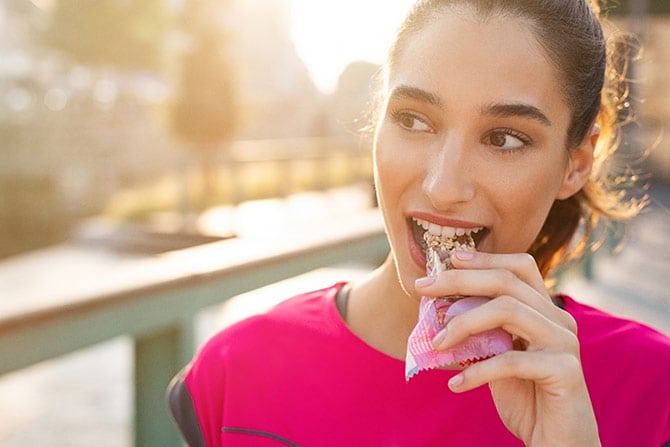
Protein shakes, energy gel, vitamins, oh my! In an interview, triathlete and running expert Andreas Butz explains what nutrition runners really need. Read up on what constitutes a healthy diet when jogging and which nutritional mistakes you should avoid.
Contents:
Being interviewed: Running expert Andreas Butz

Andreas Butz has competed in over 150 marathons, ultra runs and triathlons. Andreas knows how important the right nutrition is for runners and isn't shy about giving insights from his Runners Guide (in German). Together with his wife Mrs. Gisela Butz, the running expert published his book „Vitale Läuferküche“.
How did you and your wife get involved in nutrition?
Andreas Butz explains: „When my wife and I became parents 25 years ago, healthy nutrition for our child was our goal. We then started paying more attention. We were and still are athletes and thus wanted a diet that helped us reach our goals. This led to our 'Vital Läuferküche', a guide to a complete plant-based diet with numerous delicious recipes.“
You can find more about Andreas Butz on his website andreasbutz.com.
Why nutrition is so important for runners
To improve performance, runners use a variety of tactics: Some follow exercise schedules, others use energy gels and protein shakes. But what role does nutrition actually play for runners?
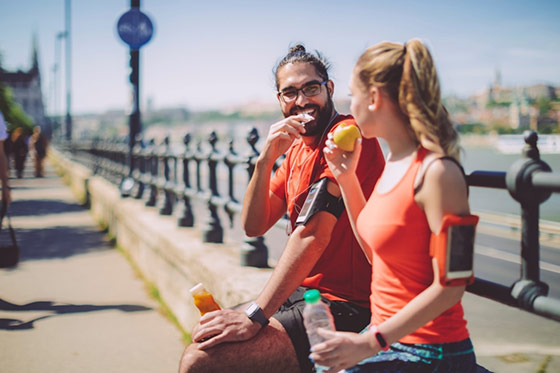
What runners should know about nutrition
We wanted to know from Andreas Butz what significance the topic of nutrition should have for runners. For experienced runners and running coaches, metabolism is the key to a better diet:
"Runners should think about the topic of metabolism (three to five times a day). Metabolism means turning nutrients into energy. A healthy diet means a healthy person. If the diet is poor, performance decreases. The human body consists of about 100 trillion body cells, and with every second around 50 million cells die. As our food is broken down to create energy, cells are created to replace the dead ones. Therefore, every meal offers a great opportunity to become healthier and more efficient".
That sounds plausible. Nevertheless, it is often difficult, not only for runners, to find the right path.
Common mistakes with nutrition
According to Andreas Butz, the biggest mistake „is not thinking about the importance of proper nutrition“:
“We mainly eat what we like. But with increasing nutritional awareness, this is changing. The second biggest mistake is believing that dietary supplements can compensate for poor nutrition. It doesn't work that way. Dietary supplements should only be taken with a medical prescription."

The ideal runner's nutrition – What matters
To stay fit as a runner and increase your performance, you should think about nutrition. Which foods are nutritious and which foods are taboo?
Wholefoods instead of Supplements
Andreas Butz explains that "nutrients and vitamins and avoiding junk food" is the most important for a successful runner's diet:
"Metabolic disturbers are, for example, corn syrup, or any non-whole grain. Alcohol is also unsuitable, even in small amounts. Too much meat and dairy tend to hinder a healthy diet. You should avoid sausage altogether," the expert explains which foods are (not only) much better suited for runners: "You can only do right with a plant-based diet: plenty of fruit, salad, vegetables, nuts and whole grain products. The less the food is processed, according to the rule of thump, the healthier the food. I also recommend choosing organic foods, as organic foods are not treated with fungicides, pesticides nor insecticides."
- Avoid metabolism disruptors: refined sugar, refined flours, alcohol, excessive meat and dairy products, processed meats
- Prefer plant-based foods: consume unprocessed foods such as fruits, vegetables, nuts, whole grains (raw foods, organic products) whenever possible.
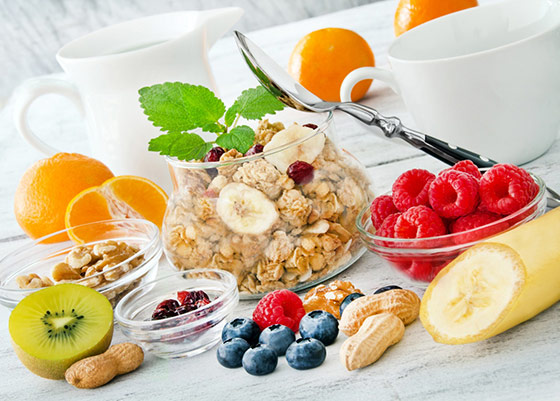
Even if you are preparing for a race, or a marathon, no special diet is necessary.
"Those who already eat a balanced diet don't need to change anything to prepare for a marathon", according to Andreas Butz. "Be sure to eat plenty of vegetables and drink plenty of fluids the day before. For long runs that train edurance and speed, we recommend only drinking water and not sports drinks. Drinking only water will make sure your body continues to burn fat instead of sugars."
Running on an empty stomach - What do you need to consider?
The topic of running on an empty stomach is widely debated. Is it a good idea to jog on an empty stomach? When should you avoid running on an empty stomach?
Andreas Butz isn't against it, per se: "Running on an empty stomach is okay. Just avoid over-doing it. What you are capable of depends on your athletic ability. It's best to avoid long runs and HIT sessions as your body will then use protein in your muscles for energy. That's not what an athlete wants."
- Running on an empty stomach is generally not a problem.
- However, avoid strenuous exercise (speed training, fast endurance runs, very long training sessions).

Eating right, before and after running
No matter whether hobby or marathon runner: Finding the right meal before and after a run is confusing for many runners.
Andreas Butz advises against carb counting – that's how you lose sight of the big picture: "The focus should be on a healthy diet and not on counting carbs. This is distracting and suggests that there are special nutrients that you should pay attention to. The overall diet is key".
What should runners eat after running?
"The more you exert yourself, the more important it is to provide your body with what it needs to repair itself.", explains Andreas Butz. "Whole wheat products along with organic fruits and vegetables help the body repair itself much faster".
Andreas Butz shows us what he eats everyday:
"I start the day with a colourful fruit salad, made from apple, banana and berries. I add 3 spoon-fulls of fresh dried oats, which I make daily with a flake squeezer, and a handful of nuts, either walnuts, hazelnuts, cashews or almonds. With this breakfast I have now run over 150 marathons, and my red blood cell count is top notch!"
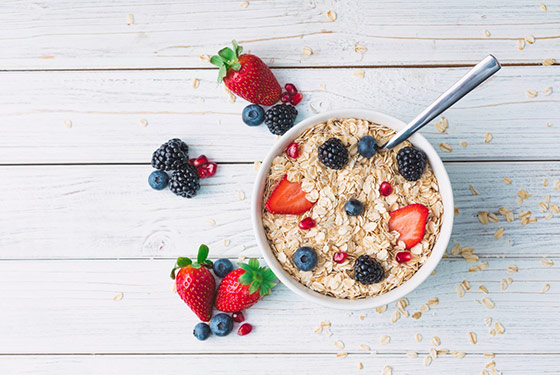
Gisela and Andreas Butz also hold special cooking classes for runners at their Vitality Cooking School, where participants also receive recipe suggestions.
Frequently asked questions about nutrition for runners
We have summarized important questions about nutrition for runners in a concise list of frequently asked questions.
What should beginners keep in mind when it comes to runner nutrition?
If you are new to running, you should focus on regularity, balance, and good tolerance:
- No experiments right before your run
- Make sure you drink enough fluids
- Eat carbohydrate-rich but easily digestible snacks before training
- After running: consume protein to aid recovery
- Approach new routines slowly
A food diary can help you document your personal tolerances.
Which foods are particularly good for runners?
These foods are considered particularly suitable for running:
- Oatmeal – provides complex carbohydrates and fiber
- Bananas – ideal source of energy before running
- Whole grain products – for sustained energy
- Lentils, beans – rich in protein and fiber
- Green vegetables & berries – rich in antioxidants
- Nuts & seeds – healthy fats and minerals
How does the nutrition of endurance runners differ from that of sprinters?
Since endurance athletes use their muscles differently than strength athletes or sprinters, their diets are also slightly different. While endurance athletes should consume more carbohydrates and less fat and protein, the optimal diet for sprinters consists of slightly less carbohydrates and fat and more protein. However, amateur runners can ignore these subtleties. In both cases, the basis is a balanced, healthy diet.
What does an optimal nutrition plan for runners look like?
An optimal nutrition plan is less relevant for recreational runners. It is much more important to consume the right nutrients before and after running in order to support the body in the best possible way.
What should you keep in mind when it comes to nutrition and running in the summer heat?
Special rules apply in high temperatures:
- Drink plenty of fluids beforehand – ideally 500 ml about 1 hour before running
- Choose easily digestible snacks
- After running: replenish electrolytes (e.g., with sodium-rich mineral water or diluted fruit juices)
- Opt for cooling foods, e.g., watermelon, cucumber, or yogurt
Are there differences in nutrition for male and female runners?
Yes, hormonal fluctuations and different metabolic processes in particular mean that there are differences in nutrition between men and women:
- Higher iron requirements for menstruating women
- Changing protein requirements depending on the phase of the cycle
- During menopause, certain nutrients (e.g., vitamin D, calcium) become more important
- Women benefit from cycle-oriented training and nutrition plans
Putting healthy nutrition into practice
A healthy and nutritious diet is essential for runners and endurance athletes. But the theoretical knowledge about the right nutrition is only one side of the coin. The diet, however, needs to be practical, as Andreas Butz emphasizes:
"Reading and knowledge is not enough. The difference is the 'implementation competence'. Never before has the collective knowledge of mankind about health and nutrition been greater and the nutrition worse. Therefore, dear readers, start today with a change. Clean up the fridge and pantry. Throw away unhealthy, fatty, sugary, frozen foods and start over and visit a local farmer's market weekly."
You'll notice changes from your diet switch soon enough: „After just four weeks of a wholefood, sugar-free, vegetable-heavy diet, you should notice the improvement in well-being and quality of life.“
We thank Andreas Butz very much for the informative interview!
For more information about running, take a look at the following articles in the owayo magazine:
Looking for high quality running sportswear? Design your jersey and more in our 3D Designer:
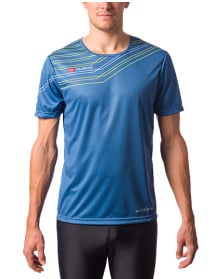
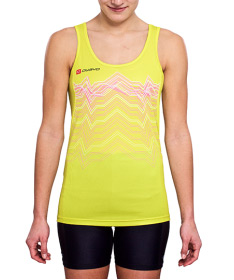
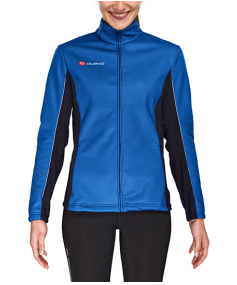
Image credits: Image 1: Ridofranz/iStock; Image 2 (Portray A. Butz): Marco Dahmen; Image 3: cherryandbees/stock.adobe.com; Image 4: Eoneren/iStock; Image 5: Santje09/ iStock; Image 6: baranq/stock.adobe.com; Image 7: nblxer/stock.adobe.com.